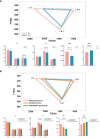Speech disorders in patients with Tongue squamous cell carcinoma: A longitudinal observational study based on a questionnaire and acoustic analysis
- PMID: 37005608
- PMCID: PMC10068158
- DOI: 10.1186/s12903-023-02888-1
Speech disorders in patients with Tongue squamous cell carcinoma: A longitudinal observational study based on a questionnaire and acoustic analysis
Abstract
Background: Speech disorders are common dysfunctions in patients with tongue squamous cell carcinoma (TSCC) that can diminish their quality of life. There are few studies with multidimensional and longitudinal assessments of speech function in TSCC patients.
Methods: This longitudinal observational study was conducted at the Hospital of Stomatology, Sun Yat-sen University, China, from January 2018 to March 2021. A cohort of 92 patients (53 males, age range: 24-77 years) diagnosed with TSCC participated in this study. Speech function was assessed from preoperatively to one year postoperatively using the Speech Handicap Index questionnaire and acoustic parameters. The risk factors for postoperative speech disorder were analyzed by a linear mixed-effects model. A t test or Mann‒Whitney U test was applied to analyze the differences in acoustic parameters under the influence of risk factors to determine the pathophysiological mechanisms of speech disorders in patients with TSCC.
Results: The incidence of preoperative speech disorders was 58.7%, which increased up to 91.4% after surgery. Higher T stage (P<0.001) and larger range of tongue resection (P = 0.002) were risk factors for postoperative speech disorders. Among the acoustic parameters, F2/i/decreased remarkably with higher T stage (P = 0.021) and larger range of tongue resection (P = 0.009), indicating restricted tongue movement in the anterior-posterior direction. The acoustic parameters analysis during the follow-up period showed that F1 and F2 were not significantly different of the patients with subtotal or total glossectomy over time.
Conclusions: Speech disorders in TSCC patients is common and persistent. Less residual tongue volume led to worse speech-related QoL, indicating that surgically restoring the length of the tongue and strengthening tongue extension postoperatively may be important.
Keywords: Quality of life; Speech acoustics; Speech disorders; Speech handicap index; Tongue cancer.
© 2023. The Author(s).
Conflict of interest statement
The authors declare that they have no competing interests.
Figures




References
-
- Di Stasio D, Lauritano D, Gritti P, Migliozzi R, Maio C, Minervini G, Petruzzi M, Serpico R, Candotto V, Lucchese A. Psychiatric disorders in oral lichen planus: a preliminary case control study. J Biol Regul Homeost Agents. 2018;32(2 Suppl 1):97–100. - PubMed
-
- Aghajanzadeh S, Karlsson T, Tuomi L, Engström M, Finizia C. Trismus, health-related quality of life, and trismus-related symptoms up to 5 years post-radiotherapy for head and neck cancer treated between 2007 and 2012. Support Care Cancer. 2023;31(3):166. doi: 10.1007/s00520-023-07605-w. - DOI - PMC - PubMed
Publication types
MeSH terms
LinkOut - more resources
Full Text Sources
Miscellaneous

